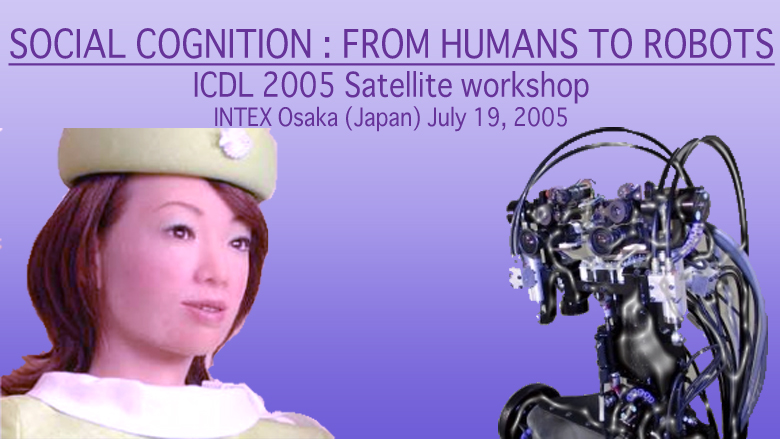


 |
 |
| 1:
ATR Computational Neuroscience Laboratory 2-2-2 Keihanna Science City, Soraku-gun Kyoto, 619-0288, Japan |
2:JST-ICORP Computational Brain Project 2-2-2 Keihanna Science City, Soraku-gun Kyoto, 619-0288, Japan |
3:Wellcome
Dept. of Imaging Neuroscience Functional Imaging Laboratory 12 Queen Square, London, UK WC1N 3BG |
Program
(some of the talk
abstracts are available. See below)
Opening
statements: objectives of
the workshop
Morning session:
Human cognition
Development
of social cognition in
infant chimpanzees -go to abstract
Decoding
the human brain: Toward
mind-reading machines
Afternoon
session: Social competence of robots
Development
of social cognition in infant chimpanzees
Masako Myowa-Yamakoshi,
<masako.myowa@nifty.com>
The University of
I will present our
recent empirical findings on the development of social cognition in
infant
chimpanzees. Firstly, we investigated the facial imitation from just
after
birth. Results showed that chimpanzee neonates were able to imitate
several
human gestures. Secondly, the ability of recognizing faces was
investigated. We
prepared photographs of the mother of each infant and an "average"
chimpanzee face. From 4 weeks of age, they showed strong preferences
for mother's
face. Thirdly, we studied gaze perception and found that the infants
aged 10
weeks preferred looking at direct/open-gaze faces. The adaptive
significance of
such early social-cognitive abilities will be discussed from an
evolutionary
perspective.
Decoding
the human brain: Toward mind-reading machines
Yukiyasu Kamitani,
<kmtn@atr.jp>
ATR Computational Neuroscience
Laboratories, Japan.
'Mind-reading' ability is a core faculty of social cognition, which arguably drove the evolution of the expanded primate brain. Now, neuroscientists are seeking to realize artificial mind-reading machines that translate neural activity into mental contents. Such technology is not only useful for the development of neuroprosthetic devices for paralyzed people, but also has a potential to alter our social communication. I will outline recent advances in neural decoding of internal representations and brain-machine interface, while focusing on non-invasive neural decoding using functional MRI, and discuss the potential impact on human social communication.
Beyond
The Cognitive Sciences: Social Robots
and The Case for a New Scientific Paradigm
Javier R. Movellan,
<movellan@mplab.ucsd.edu>
While the development of general purpose digital computers fueled the scientific agenda pursued by the cognitive sciences, the development of social robots needs to go hand by hand with a new approach to the scientific study of human nature. Cognitivism borrowed much of its cache from the development of general purpose computers, and thus, it is not coincidental for some of its major figures to dismiss the importance of robots as special purpose systems that will teach us nothing of interest. I will argue that, it is precisely these special purpose computers that are making us aware of the problems associated with operating in real-time in a highly uncertain but sensory rich environment. Moreover the development of social robots is revealing and making explicit aspects
of human nature that have been ignored for the past 40 years of cognitivism.
Besides a revolution in scientific agenda, progress in social robotics will also require a change in scientific methods. For the last 40 years the methods of the cognitive sciences have been instrumental in developing many "sex of angels" debates: early attention vs. late attention, working memory vs. short term memory, serial vs. parallel processing, analogical vs. propositional representations, symbolic vs. sub-symbolic processing, modular vs. interactive architectures. These debates have turned out to be undecidable, contributed little to our understanding of human nature, and have had little impact on society at large. Modern approaches and methods are needed that avoid scholastic debates and enable rapid scientific and technological progress.
Utilization
of social cognitive neuroscience paradigms
to investigate robots social competence
Thierry Chaminade
<tchamina@atr.jp>
The last decade has seen a growing community of researchers attempting to naturalize social cognition. These studies have led to new paradigms investigating social interactions, and new theories on the behavioural and neural bases of these interactions. The motor resonance hypothesis in particular states that the social bound originates in the automatic mapping of an observed action produced by a peer into the motor repertoire of the observer, allowing higher social cognitive functions such as action understanding or empathy.
I will present results from experiment investigating how our motor system resonates with robots’ actions, which is derived from a paradigm used in social cognition based on motor interference. I will then introduce other paradigms which could be extended to the investigation and improvement of robots’ low-level social competence.
